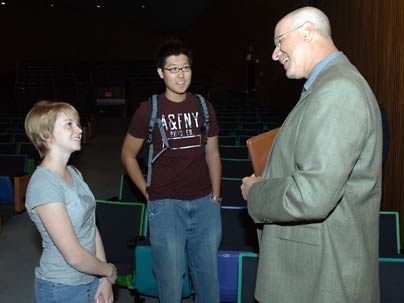Hundreds of members of MIT's Class of 2011 turned out Aug. 28 for their first official lecture, in which Ford International Professor of Political Science Richard J. Samuels challenged them to seek out knowledge about societies that are geographically and culturally remote from their own.
Samuels, director of the Center for International Studies (CIS), invited the new students to take full advantage of MIT's open, multicultural academic community and, at the same time, to participate boldly in its ever-expanding array of hands-on international work experiences.
"I hope that you will avail yourself of the many opportunities MIT provides to make sure that you step boldly and intelligently out into the global marketplace of ideas," he said in the annual faculty keynote lecture in Kresge auditorium, a featured event in MIT's Orientation Week.
In introducing Samuels, President Susan Hockfield told students that his work is "quintessentially MIT" because of its focus on applying knowledge to practical issues in the world.
Samuels (Ph.D. 1980) discussed the roles science and technology play in economic development and how societies differ in the way they approach innovation.
"The central challenge for MIT is to continue to anticipate and to stay 'ahead of the future.' And that future has even less respect for national borders than the past," he said.
Samuels has taught at MIT since 1980. The founding director, in 1981, of the MIT-Japan Program, the nation's first center of applied international studies, he urged the incoming students to consider participating in the MIT International Science and Technology Initiative known as MISTI.
MISTI interns are provided all-expense-paid internships in labs, factories and universities in Japan, China, India, Germany, France, Spain, Italy, Mexico and elsewhere.
"The ability to lead in tackling complex global issues of health, environment, energy or innovation requires scientists, managers and engineers to participate in world-wide networks of knowledge creation and use. This takes empathy and a deep understanding of foreign experience," Samuels said.
He also offered the Class of 2011 an understanding of what it may mean to become members of MIT's global community both as students and as alumni/ae.
"Our international programs will initiate you into the networks of research, management and service that will be the terrain of your professional lives. Having cappuccino on the piazza is nice. But it's nicer if you helped design the machine that made it in a lab nearby," he said.
Following Samuels' talk, Undergraduate Association President Martin Holmes, a senior majoring in aeronautics and astronautics, offered the group his personal experience with diving into extracurricular activities his first year, followed by diving into coursework his second year.
"Balance is important. Find time to relax and unwind. Form a study group! Cook with friends! And know when you need to, seek help. I spend thirty minutes each day reading the newspaper or just reflecting on the bigger picture of my life," he said.







